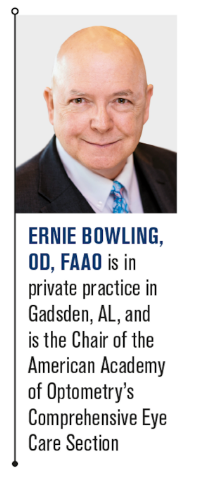The future of eye care?
I recently completed Robin Cook’s new medical thriller, Cell. Cook, best known for his books Coma and Outbreak, is an ophthalmologist by training, and his books often tie his story lines to current events. Not to spoil the book for those who want to read the novel, but the premise of Cell is that a phone app, named iDoc, has been designed to replace the primary-care physician.

I consider myself a bibliophile. I’ve had a lifelong love of books and am proud to have passed that love on to both my children. I recently completed Robin Cook’s new medical thriller, Cell. Cook, best known for his books Coma and Outbreak, is an ophthalmologist by training, and his books often tie his story lines to current events. Not to spoil the book for those who want to read the novel, but the premise of Cell is that a phone app, named iDoc, has been designed to replace the primary-care physician.
Of course, in this work of fiction things go terribly wrong and that makes for some very interesting reading, but the book really got me thinking. There are some 50,000 medical apps. If put together, that would be a powerful “avatar doctor,” as Cook called it in a recent interview.1 The golden days of patients viewing their physician as some sort of all-knowing sage and receiving all their medical information from their physician are long past: the Internet is an all-encompassing information provider. It takes only a Google search to find current information on any medical topic. How many times has a patient asked you to, “Spell what I got,” knowing his first action item will be a Google search when he gets home. Family docs, be very afraid.
Then I shuddered. Should eye docs also be fearful? “Oh, no, the skill and expertise of what we do can’t be replaced with an app!” While I wholeheartedly agree, have you heard of Opternative? Opternative markets itself as “The First Online Eye Exam That Writes You a Prescription.” 2 Opternative says its test takes 5 to 10 minutes and will cost around $35. With $1 million in funding, Opternative plans to launch this summer.
An MIT Team says it has developed a cheap, portable eye examination system called NETRA, requiring only a smartphone and a $2 plastic lens attachment.3 And Peek touts itself as a smartphone-based system for comprehensive eye examinations in even the remotest of settings.4 While these latter 2 applications have eyes (no pun intended) on providing access in underdeveloped nations to people lacking access to eye care, Opternative has other targets: your patients. Fortunately, the AOA is aware of this project and will serve as our profession’s watchdog in this arena.
Cook calls this free and widespread dissemination “the democratization of medicine.” The idea that information should be freely available to everyone is a noble concept. Knowledge is power. I believe that doctors take all the available information and filter it through their own personal knowledge and years of practical experience to tailor a treatment plan crafted to their individual patient’s needs. There is just no way an app is ever going to be capable of replacing that knowledge and wisdom. An app provides data. It is not capable of interpreting that data and making decision plans. I for one would never trust my eye or health care to some unknown physician reading my test results in a remote location, or worse, a computer-generated treatment plan. Eye and health care is an art, as well as a science, learned through years in the crucible of intense learning and preparedness and forged even stronger in years of patient care. I don’t see an app ever replacing that foundation.ODT
References
1. Virtual doctor is coming, says writer Robin Cook. The Star Online. Available at: http://www.thestar.com.my/Lifestyle/Health/2014/02/21/Virtual-doctor-is-coming-says-physicianwriter-Robin-Cook/. Accessed 2/21/2014.
2. McCarthy, C. Are you ready for online refraction?Optometry Times. Available at http://optometrytimes.modernmedicine.com/optometrytimes/news/are-you-ready-online-refraction. Accessed 02/28/2014.
3. CNN, The Big I: NETRA Cheap, Portable Eye Exam System. YouTube. Available at http://www.youtube.com/watch?v=cwkaOy_4D-U. Accessed 2/26/2014.
4. Peek Web site. Available at: http://www.peekvision.org/. Accessed 2/26/2014.
Newsletter
Want more insights like this? Subscribe to Optometry Times and get clinical pearls and practice tips delivered straight to your inbox.